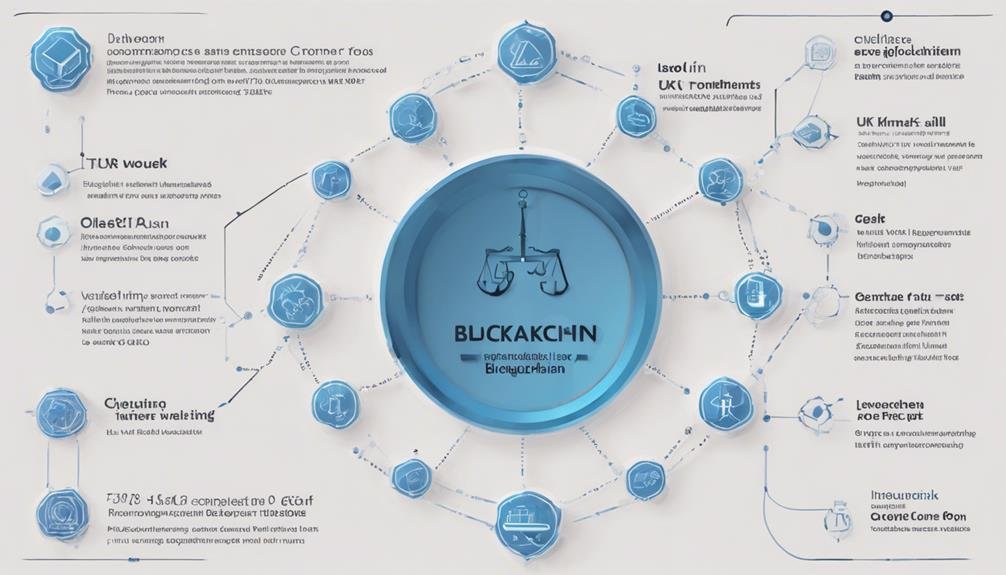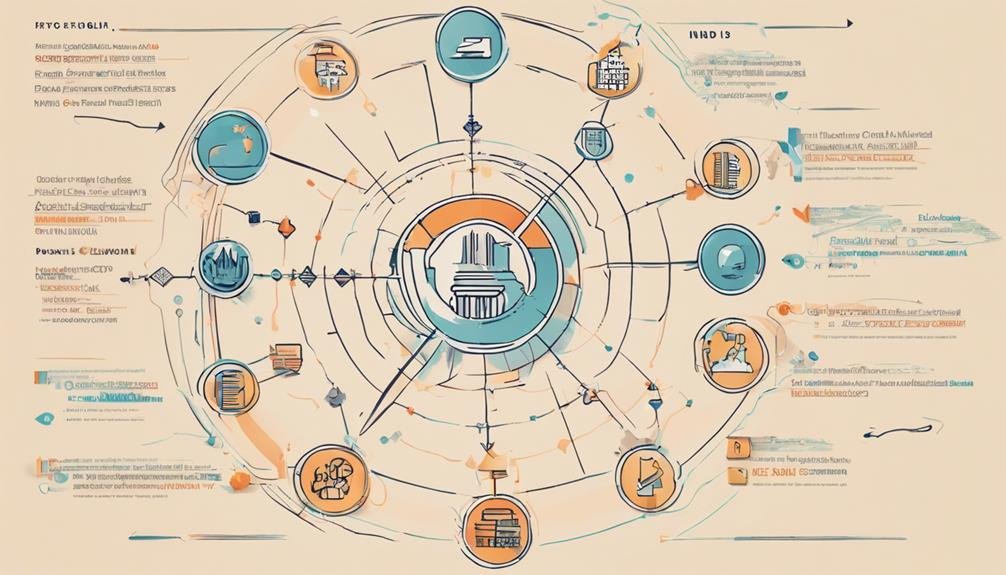A comparison of the top 10 global blockchain regulations showcases varied approaches. The United States emphasizes investor protection and compliance under SEC oversight. China has stringent rules against cryptocurrencies, opting to focus on blockchain technology. Canada aims to achieve a balance between fostering blockchain development and ensuring compliance. The UKUK enforces regulations for crypto assets under the Financial Services and Markets Act. Japan recognizes cryptocurrencies as legal property with a clear legal framework. Australia classifies cryptocurrencies as legal property and combats illicit activities. Singapore mandates MAS licensing for crypto exchanges, while South Korea regulates virtual assets. India is considering prohibiting private cryptocurrencies, and Brazil faces compliance challenges. These regulations shed light on the complex landscape of global blockchain governance.
Table of Contents
Brief Overview of Top 10 Global Blockchain Regulations Comparison
- SEC oversight in the US impacts companies like Ripple and Coinbase.
- China focuses on blockchain technology but has banned cryptocurrencies.
- Canada balances blockchain development with regulatory compliance.
- UKUK enforces regulations under the Financial Services and Markets Act.
- Japan has a clear legal framework for cryptocurrency utilization.
United States Regulations
The United States’ regulatory framework for blockchain and cryptocurrencies is primarily overseen by the Securities and Exchange Commission (SEC), impacting companies such as Ripple, Coinbase, and Binance. Under the leadership of SEC Chair Gensler, the regulatory landscape for crypto assets in the United States is evolving rapidly. Recent court decisions have influenced the treatment of crypto assets like XRP and Bitcoin ETF Trusts, aligning them more closely with traditional securities.
Chair Gensler’s statements emphasize the necessity to regulate crypto platforms to safeguard investors and guarantee market integrity. The US government’s approach reflects a shift towards viewing crypto assets through the lens of traditional securities, signaling a move toward stricter oversight and compliance requirements for industry players.
Ongoing battles between regulators, investors, and the crypto industry continue to shape the regulatory environment, highlighting the complexities and challenges of balancing innovation with investor protection in the fast-paced world of digital assets.
Chinese Regulatory Landscape

Implementing stringent regulations, China has taken a firm stance against crypto enterprises and Bitcoin mining, culminating in an outright ban on cryptocurrencies in September 2021. The Chinese regulatory landscape is characterized by strict measures aimed at controlling crypto activities to mitigate financial risks and safeguard investors. Despite the bans on cryptocurrencies, China has not shied away from embracing blockchain technology, which is evident through initiatives like the Blockchain Service Network (BSN).
The People’s Bank of China (PBOC) plays a pivotal role in overseeing virtual currencies and regulating the country’s digital asset market. China’s regulatory stance on cryptocurrencies has had a profound impact on the global crypto market, influencing industry dynamics and investor sentiments worldwide. As China continues to navigate its regulatory environment concerning blockchain and digital assets, the world closely watches for further developments and their implications on the broader blockchain ecosystem.
Canadian Blockchain Policies

With a focus on fostering a thriving blockchain ecosystem, Canada has established well-defined regulatory structures to guarantee investor protection and clarity in taxation for cryptocurrencies. In Canada, cryptocurrencies are subject to taxation based on capital gains, providing investors with clear guidelines on how to report their earnings. The country’s approach strikes a balance between encouraging technological developments in the blockchain space and ensuring compliance with regulatory frameworks.
Canada enforces stringent standards and reporting requirements for blockchain-related operations, aiming to create a secure environment for investors. Known for its advancements in blockchain technology, Canada has positioned itself as a hub for innovation in this rapidly evolving industry. By prioritizing investor protection and implementing clear tax regulations, Canada has created a conducive environment for blockchain businesses to thrive within a structured and compliant framework.
UK Legal Framework

The UK’s legal framework for blockchain and crypto assets is robust, with regulations under the Financial Services and Markets Act governing the sector. Compliance requirements related to Know Your Customer (KYC), Anti-Money Laundering (AML), and Counter Financing of Terrorism (CFT) are strictly enforced in the UK. These regulations have a significant impact on businesses operating in the crypto space, ensuring adherence to reporting obligations and contributing to market integrity.
UK Regulatory Authorities
UK regulatory authorities in the UK legal framework for crypto assets are primarily composed of the Financial Conduct Authority (FCA) and the Prudential Regulation Authority (PRA). These entities operate under the Financial Services and Markets Act, regulating crypto assets as financial instruments. The regulatory framework mandates Know Your Customer (KYC), Anti-Money Laundering (AML), and Counter Financing of Terrorism (CFT) measures for entities dealing with crypto assets.
Additionally, the UK prohibits crypto derivatives trading to safeguard investors and uphold market integrity. Compliance with Office of Financial Sanctions Implementation (OFSI) reporting obligations is compulsory for organizations involved in crypto asset transactions in the UK.
Compliance Requirements in UK
In the context of the legal framework governing crypto assets in the United Kingdom, strict compliance requirements for Know Your Customer (KYC), Anti-Money Laundering (AML), and Counter Financing of Terrorism (CFT) measures are mandated. The UK imposes reporting obligations on KYC, AML, and CFT for crypto assets to guarantee transparency and security within the sector. Additionally, there is a prohibition on crypto derivatives trading in the UK aimed at protecting investors and maintaining market stability.
Crypto businesses operating in the UK must adhere to OFSI reporting requirements, further enhancing regulatory oversight. The extension of the Financial Services and Markets Act to cover laws related to crypto assets underscores the UK’s dedication to regulating this evolving industry. Classifying crypto assets as regulated financial instruments serves to uphold consumer protection and market integrity in the UK.
Impact on Businesses
Under the regulatory framework governing blockchain technology in the United Kingdom, businesses experience a significant impact through clear guidelines and support for innovation. Businesses benefit from initiatives like Blockchain-as-a-service (BaaS) that foster blockchain technology growth. UK authorities address concerns about money laundering and fraud, safeguarding firms in the blockchain sector. The supportive ecosystem in the UK encourages the development of blockchain startups and companies within a regulated environment. The progressive regulatory framework helps businesses comply with reporting requirements and operate with legal certainty.
Japans Approach to Blockchain

Acknowledging cryptocurrencies as legal property, Japan has established a clear legal framework for their utilization within its regulatory environment. The country’s Financial Services Agency (FSA) plays a pivotal role in overseeing this sector, mandating registration for crypto exchanges to guarantee compliance with anti-money laundering (AML) and counter-terrorism financing (CFT) obligations. Japan’s proactive stance is further emphasized by the introduction of remittance rules aimed at curbing money laundering through cryptocurrency transactions. Additionally, gains from trading cryptocurrencies are subject to taxation as miscellaneous income in Japan, reflecting a structured approach to regulating this emerging asset class.
In addition to its stance on cryptocurrencies, Japan boasts a well-defined regulatory environment for blockchain technology, fostering innovation and adoption across various sectors. This approach not only ensures legal clarity but also encourages the responsible development and use of blockchain solutions within the country. Japan’s forward-thinking regulatory framework positions it as a key player in the global blockchain landscape, setting an example for other nations to follow in embracing this transformative technology.
Australia’s Regulatory Environment

Australia upholds a legal framework that classifies cryptocurrencies as legal property within its regulatory landscape. Crypto exchanges in Australia must adhere to stringent regulations set by AUSTRAC to combat money laundering and terrorist financing. Additionally, ASIC plays an essential role in regulating cryptocurrencies by imposing specific requirements on entities conducting Initial Coin Offerings (ICOs) in the country.
Furthermore, privacy coins are prohibited from being offered in Australia to guarantee transparency and prevent illicit activities in the digital financial space. It is important to note that capital gains tax applies to cryptocurrency transactions in Australia, further solidifying the government’s stance on treating digital assets as taxable commodities. Overall, Australia’s approach to regulating cryptocurrencies demonstrates a balance between fostering innovation in the digital financial sector and safeguarding the interests of investors and the broader financial system.
Regulations in Singapore

Singapore’s regulatory framework for cryptocurrencies is robust, with the Monetary Authority of Singapore overseeing licensing and compliance requirements for crypto exchanges. The classification of cryptocurrency as property under the Payment Services Act provides clarity on its legal status in the country. Additionally, the recent guidance issued by MAS regarding misleading advertising by Digital Payment Token providers highlights the authorities’ commitment to consumer protection in the digital asset space.
Singapore’s Regulatory Framework
Under Singapore’s regulatory framework, cryptocurrency is classified as property rather than legal tender. The Monetary Authority of Singapore (MAS) plays a vital role in licensing and regulating crypto exchanges under the Payment Services Act. In response to the global need for consumer protection, MAS issued guidance in 2022 to caution Digital Payment Token (DPT) providers about their advertising practices.
Additionally, Singapore implemented a framework in August 2023 aimed explicitly at regulating stablecoin issuers to enhance consumer protection further. While long-term capital gains on cryptocurrencies remain untaxed, companies engaging in crypto transactions are subject to taxation within Singapore, ensuring a balanced approach to the taxation aspect of the regulatory framework.
Compliance Requirements in Singapore
In Singapore, adherence to specific compliance requirements is essential for Digital Payment Token (DPT) providers and crypto exchanges operating under the regulatory framework established by the Monetary Authority of Singapore (MAS). DPT providers must obtain licenses under the Payment Services Act. At the same time, crypto exchanges must comply with Anti-Money Laundering (AML) and Countering the Financing of Terrorism (CFT) obligations.
In 2022, guidance was issued to emphasize responsible advertising practices for DPT providers in Singapore. Additionally, a regulatory framework introduced in August 2023 aims to oversee the issuance of stablecoins in the country. While long-term capital gains are not taxed, companies engaging in crypto transactions are subject to taxation regulations in Singapore. Adherence to these regulations is essential for maintaining transparency and security in Singapore’s blockchain industry.
South Koreas Stance on Blockchain

South Korea has taken significant steps to regulate blockchain technology and virtual assets within its jurisdiction. The country’s Financial Services Commission (FSC) has been designated as the regulator for virtual assets, ensuring compliance and oversight. South Korean regulations require cryptocurrency exchanges and virtual asset service providers to register with the Korea Financial Intelligence Unit to operate legally.
In 2021, privacy coins were prohibited from being listed on South Korean exchanges as part of the government’s efforts to enhance transparency and security in the virtual asset space. The Act on the Protection of Virtual Asset Users, effective in 2023, aims to safeguard the interests of Virtual Asset Users and establish guidelines for issuers and service providers. South Korea is actively working on implementing stringent regulations to protect users and promote responsible practices within the virtual asset industry.
India’s Regulatory Measures

Implementing regulatory measures in India involves a balancing act between fostering innovation in the cryptocurrency space and maintaining stringent financial control measures. India is considering a bill that aims to prohibit private cryptocurrencies while categorizing virtual digital assets as property. The recent Finance Bill of 2022 introduced a 30% tax on all crypto investments and a 1% Tax Deducted at Source (TDS) on crypto trades.
India’s regulatory approach to cryptocurrencies emphasizes outlining tax regulations to guarantee the collection of taxes on income generated from virtual digital assets. The country’s stance reflects a cautious approach, as it is hesitant to either outright ban or fully regulate cryptocurrencies. India’s evolving regulatory landscape demonstrates an effort to strike a balance between encouraging innovation in the crypto sector and implementing necessary financial control measures to safeguard investors and the economic system.
Brazils Blockchain Regulations

Brazil’s blockchain regulations, particularly the Legal Framework for Virtual Assets enacted in June 2023, have set the stage for the country’s approach to cryptocurrencies. These regulations impact businesses operating in the crypto space, influencing how they conduct transactions and comply with the law. However, maneuvering compliance challenges in this evolving regulatory landscape poses complexities for companies looking to leverage blockchain technology in Brazil.
Brazils Current Regulations
Despite not recognizing Bitcoin as a legal tender, Brazil has taken significant steps to regulate cryptocurrencies and boost their adoption as payment methods through the enactment of the Legal Framework for Virtual Assets in June 2023. The Brazilian Central Bank is designated to regulate cryptocurrency exchanges in the country. The regulatory framework aims to facilitate the use of digital currencies as a means of payment, allowing cryptocurrencies to be used as a medium of exchange throughout Brazil. This proactive approach indicates Brazil’s willingness to embrace the potential of virtual assets while ensuring a structured and secure environment for their utilization.
Impact on Businesses
The legalization of cryptocurrencies as payment methods under Brazil’s Blockchain regulations has significantly impacted businesses operating in the country, providing a structured framework for utilizing blockchain technology. The Legal Framework for Virtual Assets, established in June 2023, has introduced a regulatory framework that specifically addresses the needs of businesses leveraging blockchain technology.
With the Brazilian Central Bank overseeing crypto exchanges, companies now have clear guidelines for compliance and oversight. These regulations have not only facilitated the adoption of digital currencies but have also enhanced the transparency and legitimacy of businesses utilizing blockchain technology in Brazil. The ability for companies to legally use cryptocurrencies as a form of payment has fostered innovation and growth within the industry, positioning Brazil as a progressive player in the global blockchain landscape.
Compliance Challenges Faced
How do Brazil’s blockchain regulations present significant compliance challenges for businesses maneuvering the country’s evolving crypto landscape? The Legal Framework for Virtual Assets enacted in June 2023 has introduced intricate compliance requirements, making it essential for companies to navigate the regulatory framework diligently. The Brazilian Central Bank’s role in overseeing crypto exchanges adds another layer of complexity, demanding strict adherence to the established rules.
While the regulations aim to foster the adoption of digital currencies by recognizing them as payment methods, they do not confer legal tender status to cryptocurrencies. Consequently, compliance with the evolving regulatory landscape in Brazil is paramount for entities operating in the digital asset space.
- Legal Framework for Virtual Assets enacted in June 2023
- Brazilian Central Bank’s regulation of crypto exchanges
- Compliance requirements under the regulatory framework
- Recognition of digital currencies as payment methods
Frequently Asked Questions
Which Is the No. 1 Blockchain in the World?
Ethereum, a leading cryptocurrency, dominates the blockchain market with its innovative smart contract capabilities and decentralized applications. It offers lucrative investment opportunities, showcases technological advancements, and is globally adopted. Compliance with regulations further solidifies its position.
Which Country Is Best for Blockchain?
When evaluating the best country for blockchain ventures, Switzerland emerges as a frontrunner due to its robust regulatory environment, ample investment opportunities, vital technological innovation, skilled talent pool, unwavering government support, widespread market adoption, and enduring economic stability.
Are There Regulations for Blockchain?
Government oversight and legal frameworks for blockchain are essential globally. Compliance standards guarantee transparency and security, impacting industries significantly. Regulatory challenges persist, yet technology adaptation and market trends drive the evolution of blockchain regulations, fostering innovation and trust in the ecosystem.
Where Is Blockchain Now?
Blockchain technology is currently advancing rapidly across industries, with applications in finance, healthcare, supply chain, and more. Its future trends include increased adoption rates, technological advancements, and market growth despite facing challenges like regulatory uncertainties and cybersecurity risks.
Conclusion
To sum up, global blockchain regulations vary significantly across countries, with each jurisdiction implementing distinct approaches to this emerging technology. From the strict rules in the United States to the innovative policies in Singapore, the landscape of blockchain regulation is diverse and constantly evolving. Just like a complex puzzle, each piece of regulation fits together to create a thorough framework for the blockchain industry to thrive and adapt to the ever-changing global marketplace.




